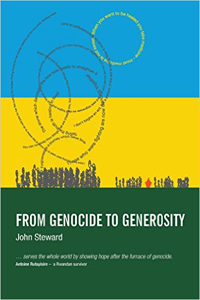
DAVID ADAMS reads a book about the power of healing in the aftermath of Rwanda’s genocide in 1994…
John Steward
From Genocide to Generosity
Langham Global Library, Cumbria, UK, 2015
ISBN: 9781783688838
 |
“The book shows that there are no easy solutions – Steward recalls locals telling him when he inquired about forgiveness and healing that ‘things like that don’t happen here’ – but what’s most captivating is not the details of how the programs work – interesting though that is – but the stories of those whose lives were transformed by them taking part.” |
In Rwanda it’s simply referred to as the ‘genocide’: the 1994 orgy of killing in which it’s estimated more than a million people were brutally slain and which led to ongoing warfare in the region.
Arriving in the aftermath of the killing in March, 1997, John Steward was employed by an NGO to conduct peace-building and reconciliation work. No small order in a nation wracked by an outspilling of hatred which counts among the worst the world has seen.
From Genocide to Generosity is the story of that work – how, through various programs, Steward – who bravely starts the book by talking about how his involvement in a men’s group in Australia prepared him for the work to come – toiled alongside a number of key figures in bringing a new sense of hope and healing to people broken by war.
The book shows that there are no easy solutions – Steward recalls locals telling him when he inquired about forgiveness and healing soon after he arrived that “things like that don’t happen here” – but what’s most captivating is not the details of how the programs work – interesting though that is – but the stories of those whose lives were transformed by them taking part.
Take the story of Deborah Niyakabirika – “Mama Deborah”, for example. She tells of how, having fled Rwanda during the genocide when many of her family members were killed, she returned to the country in 1996 only to have soldiers come to her house, take her son outside and shoot him. She talks about the hatred she felt for those who had killed him and how, confused whom she should trust – whether Hutu or Tutsi, she came to see everyone as a “potential killer”.
In her sadness, Deborah turned to God and after five days of prayer, she was directed to a passage in Matthew 18 in which Jesus told Peter to forgive “70 times seven”. She thought this was beyond her capacity but, through a series of dreams and visions, was shown that to have peace she had to meet the soldier who killed her son.
Deborah did so three months later when he returned to the house and asked for her forgiveness and, more than that, with his own parents killed during the genocide, even asked her to be his parent. Initially sending him away, she found him two days later and, recalling a dream she had in which she’d been shown “the path to heaven passes through your enemy’s house”, accepted him as her son.
It a remarkable story of transformation and healing, as Steward writes: “An uneducated woman of profound faith, Mama Deborah became a passionate advocate for forgiveness and reconciliation…”. But it’s only one of numerous such accounts within the book and its these stories that deliver the book’s punch.
One of the strengths of the book – which doesn’t explicitly come from a Christian perspective although Christianity is certainly present – is the way in which these stories are told. Drawing on recordings of sessions in which the participants told their tales, Steward allows them to tell their stories in their own voices.
The book also provides a solid overview of the circumstances which led to the genocide as well as key events in its aftermath, including the use of the Gacaca tribunal process through which more than 400,000 suspects were tried between 2001 and 2010.
An inspirational book for anyone looking to understand more about the process of reconciliation and forgiveness and the hope it can bring into the darkest places.
Follow this link to buy this book – From Genocide to Generosity.





